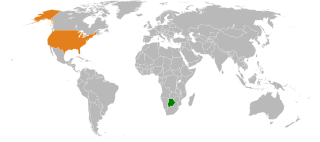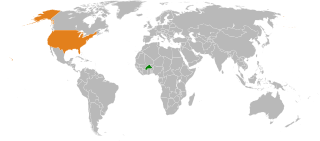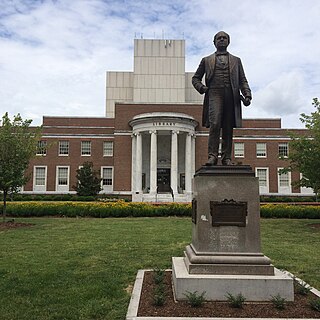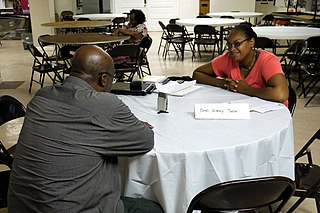The United States Agency for International Development (USAID) is an independent agency of the United States federal government that is primarily responsible for administering civilian foreign aid and development assistance. With a budget of over $27 billion, USAID is one of the largest official aid agencies in the world, and accounts for more than half of all U.S. foreign assistance—the highest in the world in absolute dollar terms.
The Charles Babbage Institute is a research center at the University of Minnesota specializing in the history of information technology, particularly the history of digital computing, programming/software, and computer networking since 1935. The institute is named for Charles Babbage, the nineteenth-century English inventor of the programmable computer. The Institute is located in Elmer L. Andersen Library at the University of Minnesota Libraries in Minneapolis, Minnesota.

The Economic Cooperation Administration (ECA) was a U.S. government agency set up in 1948 to administer the Marshall Plan. It reported to both the State Department and the Department of Commerce. The agency's first head was Paul G. Hoffman, a former leader of car manufacturer Studebaker; he was succeeded by William Chapman Foster in 1950. The rest of the organization was also headed by major business figures such as Arthur A. Kimball as well as David K.E. Bruce.

The United States Army Center of Military History (CMH) is a directorate within TRADOC. The Institute of Heraldry remains within the Office of the Administrative Assistant to the Secretary of the Army. The center is responsible for the appropriate use of history and military records throughout the United States Army. Traditionally, this mission has meant recording the official history of the army in both peace and war, while advising the army staff on historical matters. CMH is the flagship organization leading the Army Historical Program.

The British Library of Political and Economic Science, commonly referred to as "LSE Library", is the main library of the London School of Economics and Political Science (LSE). It is the largest library in the World devoted to the social sciences. The Library responds to around 6,500 visits from students and staff each day. In addition, it provides a specialist international research collection, serving over 12,000 registered external users each year. It is housed in the Lionel Robbins Building.
The California Digital Library (CDL) was founded by the University of California in 1997. In collaboration with the ten University of California Libraries and other partners, CDL has assembled one of the world's largest digital research libraries. CDL facilitates the licensing of online materials and develops shared services used throughout the UC system. Building on the foundations of the Melvyl Catalog, CDL has developed one of the largest online library catalogs in the country and works in partnership with the UC campuses to bring the treasures of California's libraries, museums, and cultural heritage organizations to the world. CDL continues to explore how services such as digital curation, scholarly publishing, archiving and preservation support research throughout the information lifecycle.

The Idaho State Historical Society (ISHS) is a historical society located in the U.S. state of Idaho that preserves and promotes Idaho’s cultural heritage. The society's vision is to inspire, enrich, and reach out to all Idahoans by providing leadership in the areas of preservation and dissemination of the state's dynamic cultural heritage.

Botswana–United States relations are the international relations between Botswana and the United States.

Burkina Faso–United States relations are the international relations between Burkina Faso and the United States. The relations are good but subject to strains in the past because of the Compaoré government's past involvement in arms trading and other sanctions-breaking activity.

The Southern Oral History Program (SOHP), located in the Love House and Hutchins Forum in the historic district of Chapel Hill, North Carolina, is a research institution dedicated to collecting and preserving oral histories from across the southern United States.

The University of North Carolina at Greensboro University Libraries system has two branches on campus, both located in Greensboro, NC. These include the Walter Clinton Jackson Library and the Harold Schiffman Music Library. Affiliated campus libraries include the Teaching Resource Center and SELF Design Studio in the School of Education, the Interior Architecture Library in the Gatewood Studio Arts Building, and the Intercultural Resource Center located in the Elliot University Center. During the fall and spring semesters, Jackson Library provides a 24/5 study space for UNCG students, faculty and staff with UNCG ID from 12 am Monday – 7:00 am Friday. Dr. Martin Halbert is the current Dean of the libraries.
Esoko is an agricultural profiling and messaging service. It is a response to the explosive growth of cellular services in Africa. Managed on the web and delivered via mobile, individuals, agribusiness, government and projects use Esoko to collect and send out market data using simple text messaging. The Esoko platform provides automatic and personalized price alerts, buy and sell offers, bulk SMS messaging, stock counts and SMS polling.
The La Guardia and Wagner Archives was established in 1982 at LaGuardia Community College in Long Island City, Queens, New York, to collect, preserve, and make available primary materials documenting the social and political history of New York City, with an emphasis on the mayoralty and the borough of Queens. The purpose of its founding went beyond serving as a repository, but to establish the college as a location for scholarly research. The archives serves a broad array of researchers, journalists, students, scholars, exhibit planners, and policy makers. Its web site provides guidelines to the collections, as well as over 55,000 digitized photographs and close to 2,000,000 digitized documents.
The Vietnam Center and Archive collects and preserves the documentary record of the Vietnam War. The Vietnam Center and Archive, part of Texas Tech University, is the nation's largest and most comprehensive collection of information on the Vietnam War. On August 17, 2007, the Texas Tech Vietnam Center became the first U.S. institution to sign a formalized exchange agreement with the State Records and Archives Department of Vietnam. This opens the door for a two-way exchange between the entities.
BlackPast.org is a web-based reference center that is dedicated primarily to the understanding of African-American history and the history of people of African ancestry. In 2011 the American Library Association's Reference and User Services Association included it in its list of the 25 Best Free Reference Websites of the Year. According to Blackpast.org, the website has a global audience of about two million visitors per year from over 100 nations. In 2009, Canada, Australia, Great Britain, Brazil, and Germany ranked as the top five countries in visitors to the site after the United States.A 2008 website review described it as easily navigable and well organized but also as containing omissions among some features and as a work in progress. By 2009, the organization was selected by New York Public Library reference librarians as one of the top 25 hybrid print and electronic resources for the year.
The International Cooperation Administration (ICA) was a United States government agency operating from June 30, 1955 until September 4, 1961, responsible for foreign assistance and 'nonmilitary security' programs. It was the predecessor of the present-day U.S. Agency for International Development.
The Smithsonian Institution Archives (SIA) is the archives of the Smithsonian Institution. SIA is located in Washington, D.C., United States, and maintains the archives related to the history of the 19 museums and galleries, the National Zoological Park, 9 research facilities, and the people of the Smithsonian.

Makerere University Library is the main library of Makerere University in Kampala, Uganda. It is the oldest academic library in Uganda, established in 1949. In addition to its primary role as an academic library, it also serves as the national reference library and the legal depository of all works published in Uganda. It has been a depository for the United Nations since 1956.

The Samuel Proctor Oral History Program (SPOHP) is the official oral history program at the University of Florida. With over 6,500 interviews and more than 150,000 pages of transcribed material, it is one of the premier oral history programs in the United States. SPOHP's mission is "to gather, preserve, and promote living histories of individuals from all walks of life." The program involves staff, undergraduate and graduate students, and community volunteers in its operation.













